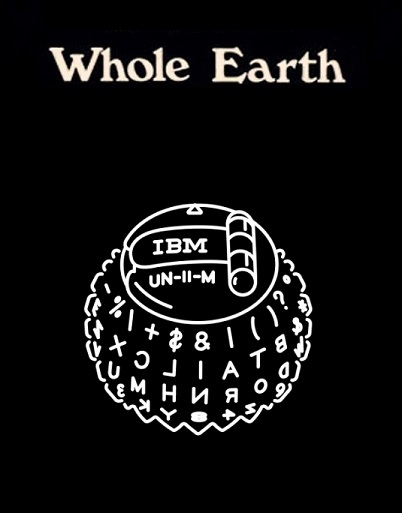
by Jürg Lehni & Jenny Hirons (SFMOMA, 2016)
Go to Whole Earth Collection Index
by Stewart Brand
Published in the winter 1998 issue of Whole Earth magazine (which was mostly a replica of the fall 1968 Whole Earth Catalog).
As unexpected and ungrammatical as a clap of thunder on a sunny day was the opening line of that first Whole Earth Catalog in 1968:
"We are as gods and might as well get good at it."
Credit where it's due: I stole the line. Page one, chapter one of A Runaway World? by British anthropologist Edmund Leach (Oxford, 1968) begins:
Men have become like gods. Isn't it about time that we understood our divinity? Science offers us total mastery over our environment and over our destiny, yet instead of rejoicing we feel deeply afraid. Why should this be? How might these fears be resolved?
Leach's book was based on his 1967 Reith Lectures broadcast on the BBC. With their bold optimism, the lectures were highly popular and also ferociously criticized in academe and the press. Alistair Cooke predicted in the Chicago Sun-Times, "Leach has suddenly come roaring up in England and no doubt will soon explode here, as middle-aged hero of the rebel young." So far as I know, I was the only rebel youngster (then age 30) to respond, but my rebroadcast of Leach's line did have a certain explosive effect. The Whole Earth Catalog also borrowed some of Leach's attitude, evident in paragraphs of his such as:
By participating in history instead of standing by to watch we shall at least be able to enjoy the present. The cult of scientific detachment, and the orderly fragmented way of living that goes with it, serve only to isolate the human individual from his environment and from his neighbors. They reduce him to a lonely, impotent and terrified observer of a runaway world. A more positive attitude to change will not mean that you will always feel secure; it will just give you a sense of purpose. You should read your Homer. Gods who manipulate the course of destiny are no more likely to achieve their private ambitions than are men who suffer the slings and arrows of outrageous fortune; but gods have much more fun!

Where the Whole Earth Catalog diverged from Leach's admirable program was in an area which still distinguishes America from England and Europe. Leach wrote, "We simply must take charge of our own fate. We must somehow see to it that the decisions which have long-term consequences are taken by men who understand what they are doing and not by bewildered amateurs." By contrast, the rest of Whole Earth's purpose statement went: "So far, remotely done power and glory as via government, big business, formal education, church has succeeded to the point where gross defects obscure actual gains. In response to this dilemma and to these gains a realm of intimate, personal power is developing power of the individual to conduct his own education, find his own inspiration, shape his own environment, and share his adventure with whoever is interested."
In other words, Whole Earth embraced the amateurs rather than deplored them. We rewrote Leach's line to: "We must somehow see to it that the decisions which have long-term consequences are taken by amateurs who understand what they are doing."
It was the shift from hierarchy to heterarchy, which is still in progress worldwide. ("Heterarchy" was coined by early cybernetician Warren McCulloch at MIT to designate networked structures in which the center of control constantly moves to wherever is most relevant and useful; he was thinking of brain function.) At a time when the New Left was calling for grass-roots political (i.e. referred) power, Whole Earth eschewed politics and pushed grassroots direct power - tools and skills. At a time when New Age hippies were deploring the intellectual world of arid abstractions, Whole Earth pushed science, intellectual endeavor, and new technology as well as old. As a result, when the most empowering tool of the century came along - personal computers (resisted by the New Left and despised by the New Age) - Whole Earth was in the thick of the development from the beginning.
So far as I can tell, the 1968 Whole Earth Catalog was the first example of desktop publishing. The breakthrough tool was the IBM Selectric Composer a fancy electric typewriter with a replaceable "golf ball" instead of individual keys striking the paper. The many type fonts and sizes you see in this replica of the '68 Catalog are how many "golf balls" we had. Typesetting was instant and cheap. The other revolutionary tool was a Polaroid MP-3 camera, which allowed us to copy line shots directly from books and to make halftones which could be pasted right onto the layout sheets. Handling graphics was instant and cheap.
We were as publishers and tried to get good at it.